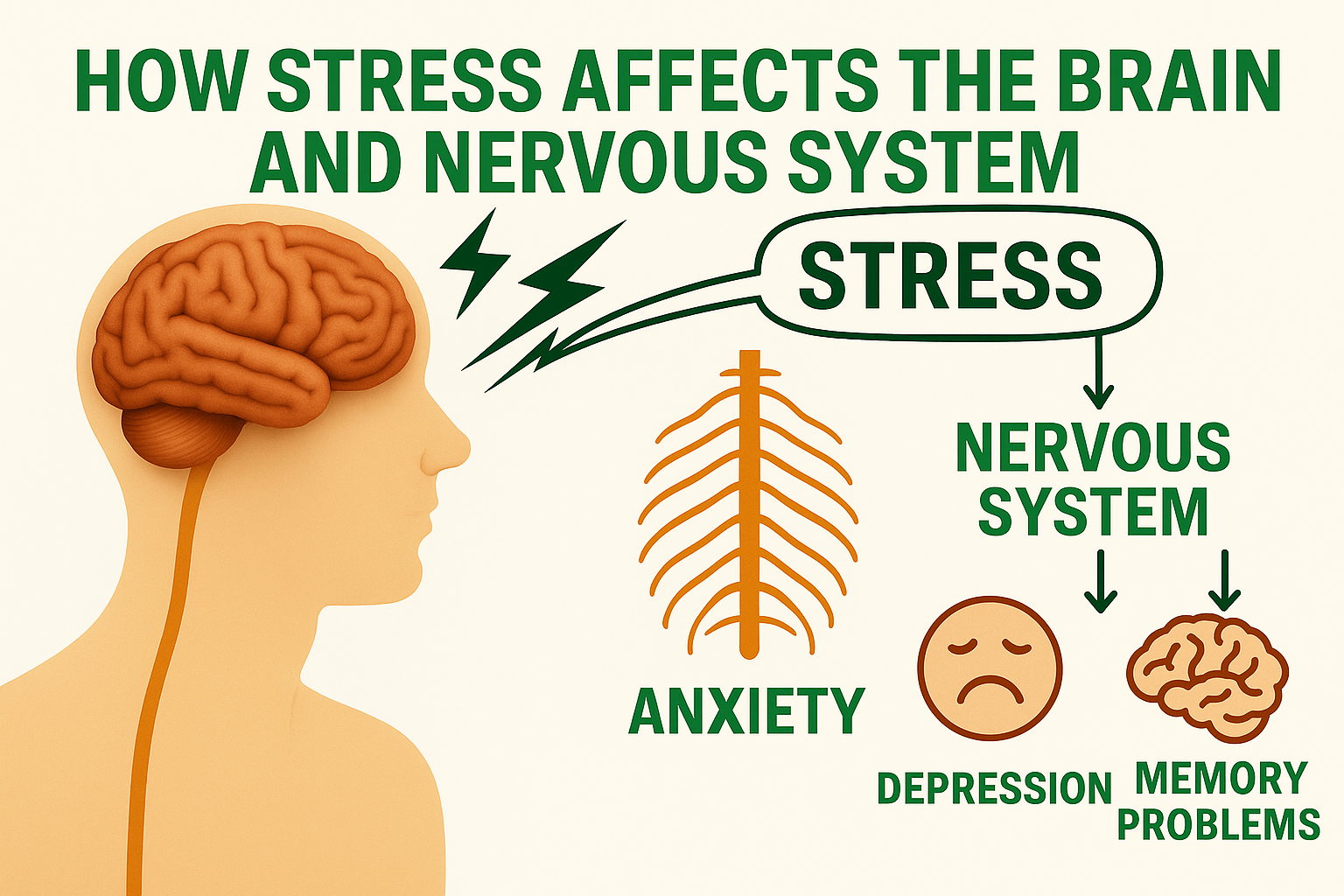
Brain and Nervous System, How it relates to Stress? We all deal with it. But have you ever stopped to think — Can you imagine what exactly your brain is doing with you at that time? In this blog you will get to know the brain functions and How Stress Affects the Brain and Nervous System?
Let’s say you’re stuck in traffic, you are running late, and your phone’s buzzing. Your thoughts are racing and the tight feeling in your chest. It means the stress of taking the driver’s seat. Here’s the twist: it’s not just “in your head.” It’s reshaping your brain and messing with your nervous system quietly and slowly.
Let’s break it down. Not like a textbook. Like a real-life story — yours, mine, all of ours.
How Stress Triggers the Brain’s Panic Button
When stress hits, your brain doesn’t ask politely, “Is everything alright?” No. It hits the alarm button very hard. The amygdala (your brain’s emotion Headquarter) wakes up fast like a guard dog. The hypothalamus then signals the adrenal glands to release stress hormones like cortisol and adrenaline. Once these are released, your heart races, breathing becomes faster, and muscles tense up. Sounds familiar?
In small doses, this is helpful. You focus and move quicker. You survive, but when this happens all the time — it’s like your body thinks it’s in danger 24/7.
What Stress Does to Your Brain and Nervous System
When stress continues for too long, it not only just cloud your thoughts, but also affects how your brain and nervous system to communicate with each other.
1. Memory and Focus are messed up.
Your hippocampus, which handles memory, shrinks with long-term stress. You start forgetting things, and can’t concentrate. That “brain fog” you feel and that’s real!
2. Decision-Making will be a puzzle.
Your prefrontal cortex, which helps with planning and thinking clearly, slows down. The stress makes you more impulsive, and more reactive.
3. Your Mood Goes for a Ride
Anxiety, sadness and anger are all major symptoms of Chronic stress. It messes with the brain’s ability to regulate emotions.
How Stress Affects the Nervous System Under Pressure?
Your nervous system controls everything — from blinking to running marathons, and maintaining stress.
• The Sympathetic Nervous System gets stuck in overthinking. You stay in “fight-or-flight” mode.
• The Parasympathetic Nervous System — which calms you down and gets pushed aside.
Common symptoms of weak nervous system:
• Shaky hands
• Fast heartbeat
• Sweating
• Even digestive problems
Yes, stress affects your stomach too when you have a weak nervous system. Consult Our Physician for reverse your nervous system.
→Must Read: 10 impactful ways to prevent Neurological disorders
Real Talk: How Your Brain Recovers from Stress
Your brain is amazing. It can heal and grow. It’s called neuroplasticity — the brain’s way of rewiring itself.
How to Reverse the Effects of Stress on the Brain Naturally
1. Breathe Like You Mean It (Yoga)
Deep belly breathing calms your nervous system in minutes. Do it every morning or when stress spikes.
2. Move Your Body (Exercise)
Exercise helps you in weight loss, but it boosts the brain chemicals like dopamine and serotonin as well. Even a 20-minute walk helps a lot and activates your cells and keeps you stress free.
3. Sleep = Brain Repair
Stress can wreck your sleep. And poor sleep increases stress. Break the cycle — aim for 7–8 hours, every night.
4. Feed Your Brain Right (Diet)
Omega-3s, leafy greens, berries. Eat those foods in your diet that help reduce inflammation and protect brain cells.
5. Talk It Out
Stress builds up if we don’t talk. Share with a friend, in a Journal. Or speak to a therapist. No shame in it.
Remember, your brain and nervous system are resilient. With the right care, both can recover and stay balanced even during stressful times.
FAQ(Frequently Asked Question)
Yes, a long-term exposure can harm your brain cells. It helps to increase the high cortisol levels especially in areas like the hippocampus. Think of it like a battery getting drained slowly that function fades over time.
Watch for common signs like: Forgetfulness, Poor focus, Overthinking, Trouble sleeping, Mood swings. If your mind feels “off” and it’s been happening for weeks, stress could be the root.
Absolutely. Stress can trigger: Tingling or numbness, Headaches, Muscle twitching, Dizziness. Sounds scary, right? But most of these fade once stress is managed. Still, don’t ignore it — get checked if symptoms last.





